The Intel Skylake-X Review: Core i9 7900X, i7 7820X and i7 7800X Tested
by Ian Cutress on June 19, 2017 9:01 AM ESTBenchmarking Performance: CPU Encoding Tests
One of the interesting elements on modern processors is encoding performance. This includes encryption/decryption, as well as video transcoding from one video format to another. In the encrypt/decrypt scenario, this remains pertinent to on-the-fly encryption of sensitive data - a process by which more modern devices are leaning to for software security. Video transcoding as a tool to adjust the quality, file size and resolution of a video file has boomed in recent years, such as providing the optimum video for devices before consumption, or for game streamers who are wanting to upload the output from their video camera in real-time. As we move into live 3D video, this task will only get more strenuous, and it turns out that the performance of certain algorithms is a function of the input/output of the content.
HandBrake H264 and HEVC
As mentioned above, video transcoding (both encode and decode) is a hot topic in performance metrics as more and more content is being created. First consideration is the standard in which the video is encoded, which can be lossless or lossy, trade performance for file-size, trade quality for file-size, or all of the above can increase encoding rates to help accelerate decoding rates. Alongside Google's favorite codec, VP9, there are two others that are taking hold: H264, the older codec, is practically everywhere and is designed to be optimized for 1080p video, and HEVC (or H265) that is aimed to provide the same quality as H264 but at a lower file-size (or better quality for the same size). HEVC is important as 4K is streamed over the air, meaning less bits need to be transferred for the same quality content.
Handbrake is a favored tool for transcoding, and so our test regime takes care of three areas.
Low Quality/Resolution H264: He we transcode a 640x266 H264 rip of a 2 hour film, and change the encoding from Main profile to High profile, using the very-fast preset.
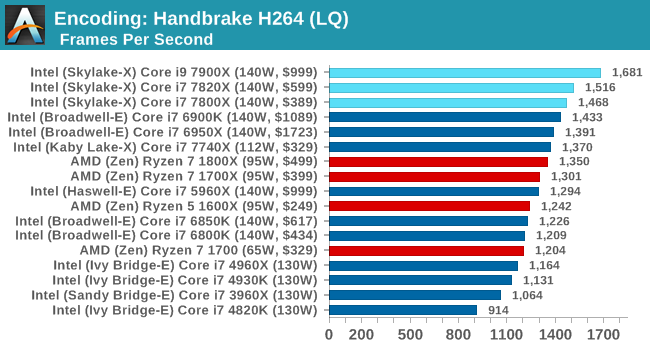
More cores, more frequency, more IPC, more fun: the Core i9-7900X wins here, and even the i7-7800X wins out against the Core i7-6900K.
High Quality/Resolution H264: A similar test, but this time we take a ten-minute double 4K (3840x4320) file running at 60 Hz and transcode from Main to High, using the very-fast preset.
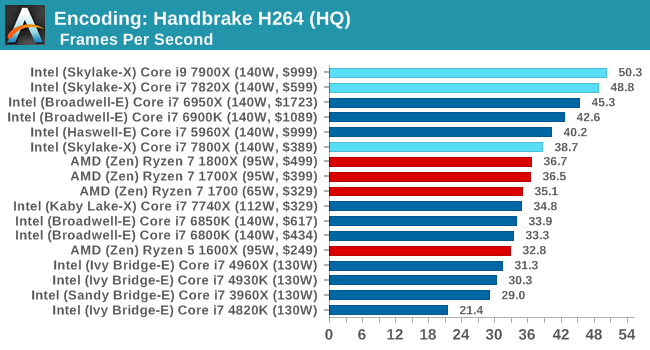
Moving into HQ mode means making the job more parallel, so the higher core counts stay at the top of the chart.
HEVC Test: Using the same video in HQ, we change the resolution and codec of the original video from 4K60 in H264 into 4K60 HEVC.
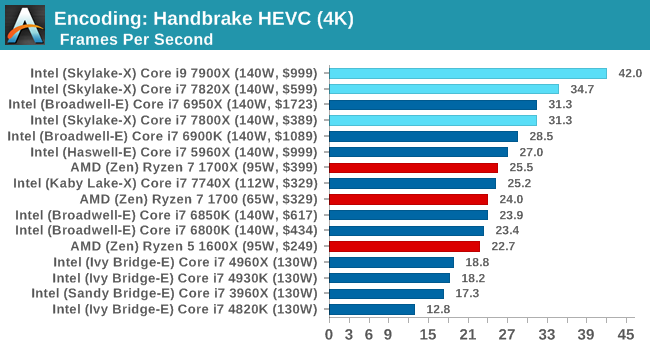
WinRAR 5.40
For the 2017 test suite, we move to the latest version of WinRAR in our compression test. WinRAR in some quarters is more user friendly that 7-Zip, hence its inclusion. Rather than use a benchmark mode as we did with 7-Zip, here we take a set of files representative of a generic stack (33 video files in 1.37 GB, 2834 smaller website files in 370 folders in 150 MB) of compressible and incompressible formats. The results shown are the time taken to encode the file. Due to DRAM caching, we run the test 10 times and take the average of the last five runs when the benchmark is in a steady state.
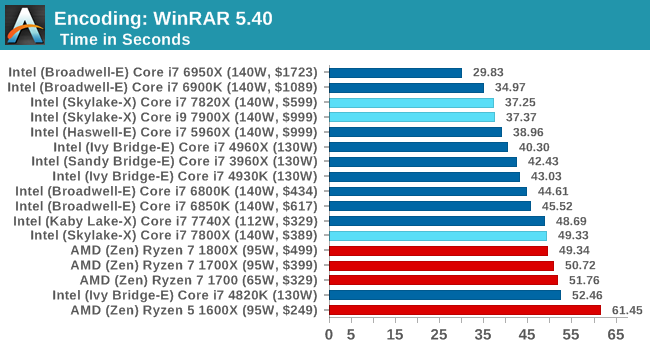
WinRAR loves having access to all the caches as much as possible, to prefetch and store data as needed. The Skylake-X chips fall back a bit here, even with DDR4-2666 support. The Core i7-7800X uses DDR4-2400 memory, so puts it further behind. Interesting didn't realise that the lower core count Broadwell-E chips were affected so much by this test, and the higher core count Ivy Bridge-E parts are faster here.
AES Encoding
Algorithms using AES coding have spread far and wide as a ubiquitous tool for encryption. Again, this is another CPU limited test, and modern CPUs have special AES pathways to accelerate their performance. We often see scaling in both frequency and cores with this benchmark. We use the latest version of TrueCrypt and run its benchmark mode over 1GB of in-DRAM data. Results shown are the GB/s average of encryption and decryption.
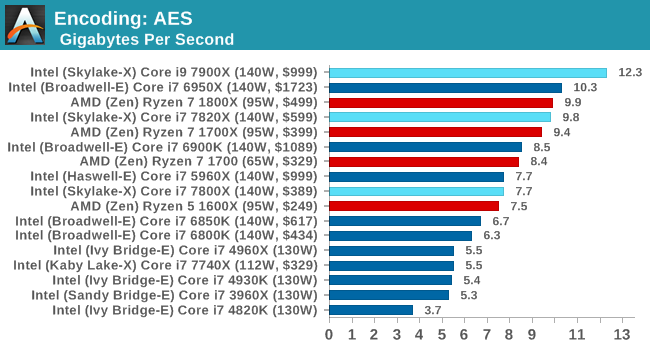
7-Zip
One of the freeware compression tools that offers good scaling performance between processors is 7-Zip. It runs under an open-source licence, is fast, and easy to use tool for power users. We run the benchmark mode via the command line for four loops and take the output score.
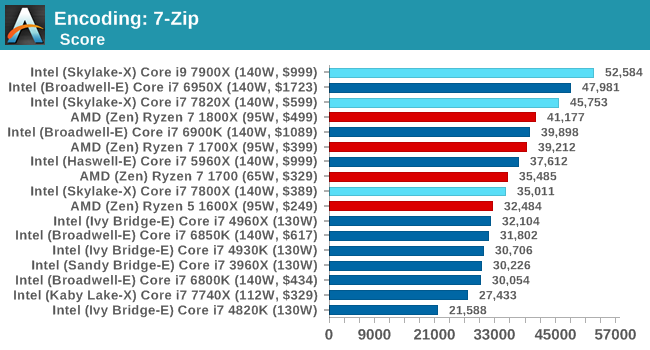










264 Comments
View All Comments
Soheil - Sunday, June 25, 2017 - link
Anyone knows why 1600X better than 1800X?OddFriendship8989 - Thursday, June 29, 2017 - link
I'm late here as usual but why are you not comparing against the 7700k and 7600k? I get that these are HEDT chips, but it's worth comparing against the high end mainstream especially when the 7800x and 7700k are priced similarly that someone MIGHT consider jumping over.I hate to say it but this is the typical stuff you guys used to do, and I know it takes more time to put together more CPUs, but logical comparisons MUST be made and these charts show a bit of laziness.
ashlol - Friday, June 30, 2017 - link
can we have the GPU tests pleaseOxford Guy - Saturday, July 1, 2017 - link
"The discussion on whether Intel should be offering a standard goopy TIM or the indium-tin solder that they used to (and AMD uses) is one I’ve run on AnandTech before, but there’s a really good guide from Roman Hartung, who overclocks by the name der8auer. I’m trying to get him to agree to post it on AnandTech with SKL-X updates so we can discuss it here, but it really is some nice research. You can find the guide over at http://overclocking.guide."If you have a point to make then make it. After all, you said you've already "run" this discussion before. Tell us why polymer TIM is a better choice than solder (preferably without citing cracks from liquid nitrogen cooling).
ashlol - Monday, July 3, 2017 - link
Anyway both are bad since you have to delid it to achieve good cooling. I have delidded a 4770k and a 6700k and put liquid metal TIM between the die and the IHS and they both run 15°C cooler at 4.6-4.7GHz@60°C with custom loop. And from seeing the temperature under overclock I will have to delid those skylake-x too.parlinone - Tuesday, July 4, 2017 - link
What I find most shocking is a $329 Ryzen 1700 outperforms a $389 7800X at Cinebench...for less than half the power.The performance to power ratio translates to 239% in AMD's advantage. That's unprecedented, and I never imagined to see that day.
dwade123 - Thursday, July 6, 2017 - link
Only in Cinebench and AES is where Ryzen look good. 7800x beats the 1800x in everything else in this review. Ryzen is too inconsistent in both productivity and gaming. It is priced accordingly to that and not out of good faith from AMD. This is also the reason why Coffee Lake will only top out at 6 cores. because it can consistently beat the best Ryzen model.IGTrading - Friday, July 14, 2017 - link
I absolutely disagree with the conclusion. The correct conclusion can only drawn when comparin apples to apples. Oh, if you want to be objective and compare apples to oranges, you can't just take into considerantion today's benchmark results and price. Have we forgotten about the days we REVIEWERS were complaining about the high power consumption of Pentium 4 and Pentium D ?! What about the FX 8350 ?! Is power consumption not an objective metric anymore?! What about platform price ?! What about price/performance?! Why do some people get suddenly blinded by marketing money?! Conclusion: i-7900X is the highest performance the home power user can get today if money for the CPU , mobo and subsequent power consumption are not an issue. Comparing apples to apples or core for core, the i7820X clearly shows Intel's anxiety with Zen. The i7820X consumes 40% more than the AMD 1800X and costs 20% more while its motherboard is 200% the price. So paying all these heaps of money, CORE for CORE the Intel 7820X is a bit faster in some benchmarks, as it should be considering the power consumption and price you pay, EQUAL in a few benchmarks and SLOWER in a few other benchmarks. Would you pay the serious extra money for this ?! And put up with the 40% higher power consumption and heat generation ?! Come ooooon ...azulon1 - Sunday, July 16, 2017 - link
Wow how exactly is this fair that Intel gets a pass for gaming, because there were problems with the problem with the platform. If I remember Rison also had a problem with gaming. But it didn’t stop you guys then did it. don’t group me into AMD fanboy, But why such a bais?Soheil - Saturday, July 29, 2017 - link
no one answer to me? why 1600X better than 1700 and 1700X and some time better than 1800X?what about 1600? is good like as 1600X for gaming or not?